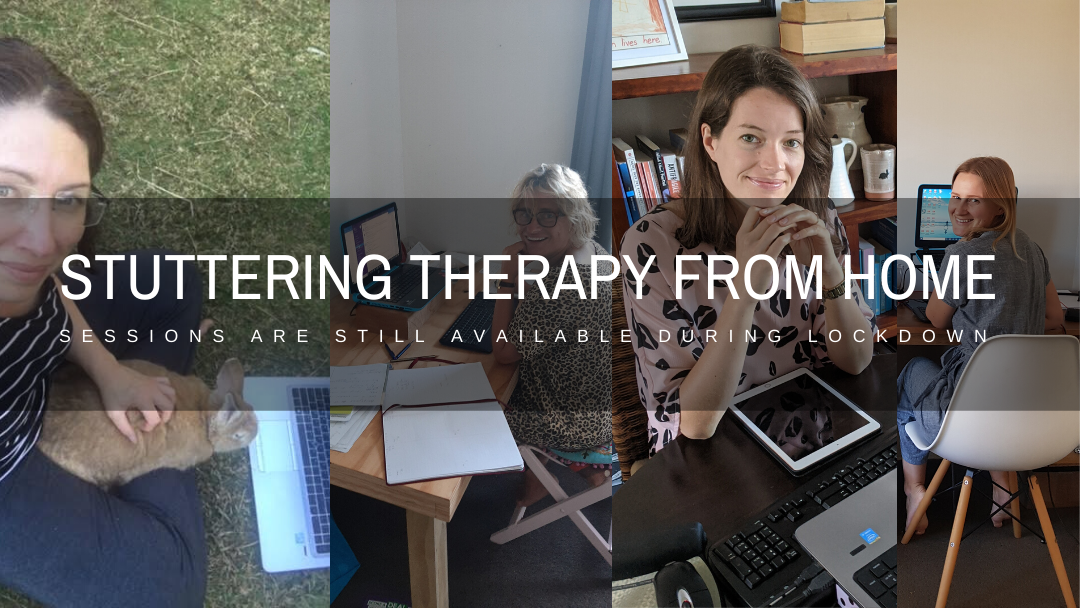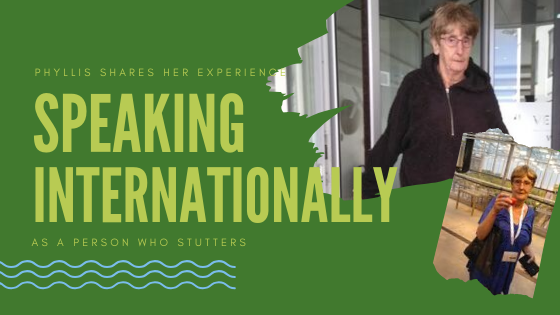Janelle Irvine (Executive Director) and Dean Cook (Board Member) from the Stuttering Treatment and Research Trust (START) were interviewed on Breakfast on TV1 on 12 February to discuss The Genetics of Stuttering Study. It was also a great opportunity to talk more about stuttering with Dean sharing some great suggestions of how to interact with a person who stutters.
Celebrating the Unsung Heroes: A Teacher’s Impact on My Journey
To celebrate Teacher’s Day (October 5th) this year, we have a story we’d like to share with you which demonstrates the impact teachers can have on our lives. Recently, Zheen Abdullazada shared with us a pivotal moment in her teenage years that has had a lasting impact and we’d like to share it with you.
“As a little girl, I dreamt of becoming a lawyer. I was a talkative kid and my family never made me feel there was something ‘wrong’ with me so I didn’t know I had a ‘stutter’ until I started school – when peers started bullying me for something I didn’t understand.
I remember feeling like I couldn’t be a lawyer because I thought I sounded stupid and incoherent when I talked. Despite the challenges of public speaking, I didn’t shy away from raising my hand in class or giving speeches, even though my stutter made these experiences daunting. Sometimes, I would stutter for minutes on a word and my throat would physically hurt.
It wasn’t until my Year 12 English teacher, Mrs Taylor, took me aside one day and told me about START. In January 2015, when I was 16 years old, I attended a week-long course specifically for teenagers who stutter. This connected me with a group of incredible young people. Together we formed deep bonds and learnt invaluable information about stuttering and useful speech techniques that I still use to this day. I owe my accomplishments to Mrs Taylor and START – without them, I wouldn’t have the tools, confidence and support to pursue my dreams.
It’s easy for someone with a stutter to allow it to dictate their life and choices – START encourages and fosters the opposite. The course I attended at START during those important years at high school transformed my life. It taught me how to ‘manage’ my stutter instead of letting it ‘control’ me and I’ve never forgotten that it’s all thanks to Mrs Taylor for letting me know about START in the first place.
Fast forward to 2023 – I’m now 24 years old and recently graduated from the University of Auckland with a Conjoint Law and Arts Degree, double majoring in Politics and International Relations, and Criminology. I’ve just finished my professional legal studies course and I work as a litigation lawyer for a law firm in Tāmaki Makarau. I’ve recently joined the START Board as a Shadow Board Member so that I can learn how a Board works and give back to the organisation that’s given so much to me.
When I look at all of these accomplishments I’m brought back to that moment at high school where Mrs Taylor took the time to connect with me on a deeper level, and got me the help I needed – a great teacher can have a life changing impact”.

Zheen Abdullazada
We know and appreciate the impact teachers can have. With many more stories just like Zheen’s, we know how helpful supportive teachers can be in the lives of young people who stutter.
Brush up on your knowledge about stuttering and how to support students who stutter in our FREE Teachers Resource here, or check out our page specifically for teachers to learn more about stuttering here.
Entering the Workforce as a Person who Stutters – William’s Perspective
Kia ora START community
I’m William, and I’ve been stuttering since the age of three. Janelle was my speech language therapist going through school where I gradually developed my own set of stuttering tools and techniques. Currently, I am studying at the University of Otago and trying to navigate entering the workforce. This stage of a tertiary pathway can be confronting and daunting for young stutterers so I thought I would write a brief reflection about my experiences with the hope of answering some questions younger stutterers might have.
The asset of a stutterer’s unique set of experiences
As most stutterers know, stuttering can be socially alienating and cause anxiety when speaking in public. After feeling bullied, I can remember crying in Janelle’s office at START asking her to wave her magic wand and take my stutter away. However, these difficult experiences give stutterers a unique perspective and change how we interact in group situations. For example, stutterers understand the value of letting people finish their sentences, being inclusive, and hearing everyone’s ideas. Therefore, I think stutterers can have confidence knowing that you have unique skills because of your experiences as a stutterer.
First impressions and applying for jobs
In a professional context, first introductions can widely vary from person to person. Naturally people will have questions if your stutter is noticed, however it is an opportunity to be authentic and not anything to be afraid of. This scenario is a chance to show employers you are empathetic and receptive which is what employers are hunting for. Recruiters do not care if you stutter; if you can work in a team, have a good character, and work hard, you’ll be fine! After all the US President, Joe Biden, has a stutter.
Stuttering in the workplace
Stuttering is treated very differently outside of school. If someone discredits or mocks a stutterer, it reflects poorly on the character of that individual. In larger companies particularly, human resources departments are dedicated to ensuring that a bullying culture cannot thrive. Additionally, when co-workers want to discuss stuttering it can be confronting, however it is an awesome opportunity to share a stutterer’s experience with genuine people trying to develop understanding.
Building up other skills
Being a stutterer is also an opportunity to give back and interact with START and the wider stuttering community. There are many leadership opportunities in a safe, inclusive environment for stutterers, such as providing peer support at schools or speaking to a group of children and young people who stutter. These are opportunities to develop leadership skills and can give confidence to branch out into clubs, societies, and other roles.
Overall, with a stutter, one has a unique set of experiences and it doesn’t need to define or limit job prospects. It’s about going out, meeting people amongst different communities, building a deep and wide knowledge base, and finally pushing yourself out of your comfort zone. Let’s go smash it!
William Missen
William welcomes anyone who would like to talk to reach out to him. If you email us at support@start.org.nz we can forward your email on to him.
Navigating Christmas
Kia ora, I’m Felix, a social worker at START and a person who stutters.
Christmas is a festive but often busy time of year. We’re looking forward to a well-deserved summer holiday and spending quality time with family and friends but before then, there’s often a lot of “social” events which can be a bit stressful and worrying for some people who stutter.
I explained in my previous blog that social gatherings can be intimidating and tricky to navigate for people who stutter for various reasons. So, if you’re a person who stutters and you’re feeling a bit worried about the social demands of Christmas some of the suggestions below might be helpful for you.
- Before you arrive at an event or gathering, remind yourself that our reactions to our own stuttering moments and how we continue conversations makes a real difference to us and our confidence, and has an influence on the listener and their reaction too. So, how do you react to and deal with your stuttering moments when they happen? What are you happy with? Is there anything you would like to do differently?
- If bigger groups worry you (e.g. work Christmas parties), try to have one conversation at a time. Talk with a person you trust and feel comfortable with first. This can help you settle in, and give you time to relax as your build up your confidence to socialise with others.
- Try to stick to your own pace, pitch and tone of voice, which aligns with my previous point. Don’t let yourself get rushed. Adapting to other people’s speech patterns can be distracting and throw you off balance.
- Take regular breaks, e.g. take a breath of fresh air and remind yourself of all the aforementioned tips and tricks. This can be helpful if you notice you’re becoming a bit tense and stressed and your stuttering is increasing.
- Be kind to yourself and remember you’re not at the work Christmas party or family get together to speak as fluently as possible or hide your stutter as much as you can. You’re there to celebrate a successful work year, connect with your colleagues or spend quality time with your loved ones. Be mindful to not let your stutter distract you and become the focus of your interactions.
- I know we sometimes worry about not being social “enough” due to our stutter. Let me assure you, you are social “enough”! Don’t pressure yourself to be a social butterfly if that’s just not you. But at the same time it’s also fine if you enjoy being social and engaging with others. We all have different personality types with different “social” comfort zones and that’s totally okay. What matters is that you feel comfortable to communicate and say what you want to say regardless of where you are, who you are with and if you happen to have a few speech bumps along the way.
At the end of the day, Christmas is not about how much we stutter or how much we say. It’s about “togetherness”, connecting with others, thinking about what’s important to us and appreciating what we have in life. Now, go on and have fun socialising with your workmates, family and friends and treat yourself to an extra slice of pavlova – you deserve it!
Therapy for stuttering still available during the COVID-19 lockdown
Connecting with people through technology is more important now than it’s ever been before. We are incredibly fortunate to have so many different devices and apps available that enable us to connect, albeit virtually, with our loved ones, colleagues and clients during this difficult time.
The transition to working from home, and connecting with our clients via video call has been a fairly smooth one for the Speech Language Therapists at START, as we have been using Skype for stuttering therapy for a number of years. We already see approximately 30% of our clients via Skype, so we are pleased that we can continue to offer this option to all existing and new clients during this time.
Therapy via Skype has enabled us to further our reach, and provide stuttering therapy to people of all ages across New Zealand. We are no longer bound to see only Auckland based clients, and for our Auckland based clients it gives them the flexibility to avoid the traffic if needed. This is important to us, as every person who stutters in New Zealand should have access to specialist support at any time.
The current situation will look different for every household, with the capabilities and stressors for each person varying and likely changing over time. We expect that as people settle into their new routines (or lack of), and ways of living, they may find time to focus on something new. For people who stutter, or parents and caregivers of people who stutter, this may be a good opportunity to engage in or re-engage in therapy.
You may wonder what therapy via Skype looks like.
It might be hard to imagine what therapy via Skype looks like, particularly with active pre-schoolers, but one of our SLTs, Anna Hearne, who is experienced in providing therapy via Skype has the following to say. “It works just the same. Just like in a therapy session, the pre-schooler doesn’t just sit in one spot…but the parent is still there”. Children often have experience in talking to friends and family members via video call, and are usually more than willing to talk to us about their bug collections and favourite toys. For older children, teens and adults, therapy looks much the same as a face to face session.
So, just how effective is it?
Research has shown that therapy for stuttering via video call is just as effective as therapy in person.
For people interested in attending Skype therapy and provided you have a device with webcam or camera abilities, we can schedule an appointment for you. We will continue to be available to contact via phone and email.




Speaking on the international stage as a person who stutters
Phyllis shares her experience speaking at International Stuttering Association’s World Congress 2019
In July 2019, Phyllis Edwards travelled to Iceland to attend the International Stuttering Association’s World Congress 2019. The theme was Embrace Your Stutter.
Phyllis lives in Paraparaumu on the Kapiti coast just outside of Wellington, and first made contact with START last year. She works for Castle Kids Kapiti and is very keen to share her story of growing up with a stutter in order to help others (particularly women) on their own stuttering journey. She has kindly offered to share with us her experience of speaking at an open microphone session at the World Congress. We hope you enjoy reading this as much as we have.
Thanks so much Phyllis for sharing so openly and honestly with us all.
Here I am sitting in the second row from the front in the Ork Hotel Conference Room feeling both excited, nervous and blessed that I got here. I am glad I hadn’t managed to talk myself out of it like part of me had tried to do.
In fact, I did quite a bit to try and prevent my being here. First, I had sent an email to Gina, our travel agent saying “Please tell me it is not possible for Donald and I to go to Iceland”. Gina, unfortunately, emailed back saying “Phyllis it is very possible”. Then, as we were going in to our annual bank review the ever-supportive Donald said “Phyllis I am going to ask to put the money for the trip on to our mortgage.” “No“ I protested. “Yes” said Donald “I believe in you.”
Try as I might to self-sabotage, I still made it to Iceland.
At least I was dressed for success. I was wearing a comfortable top given to me by our manager Tess, designer undies made with love from my trusty YouTube friend Lauren, and jeans from my friend and ex-supervisor Karen. My plan was if I wore clothes from people who believed in me, I would believe in myself too.
Then it all began.
The woman hosting the session said Anita Blom (international speaker, person who stutters, and my own mentor), would be sharing her keynote address after the open mic. Two people who I thought were amazingly brave got up and spoke. Then I heard the host offer one more chance for people to speak during this open mic session. “Who would like to speak” she asked.
My hand (that is known for having a mind of its own) shot up and I heard this voice calling out “Me, me please my turn”. The woman smiled, and held the microphone out as I rushed up. I opened my mouth and I heard this person saying “Hello, my name is Phyllis Edwards from New Zealand. Thank you for having me.” I then heard a fluent voice talking over me – I realized it was me speaking. “Oh no,” I thought, “What do I do now if my mouth won’t work?”
Suddenly I had this picture in my mind of the friends I knew were supporting me back home. I
thought of Alexis Parker, my adopted English sister who also stutters, Janelle from START, who I am proud to be affiliated with, and Anita Blom who had mentored me and suggested it was my turn to pay it forward. She mentioned this after I contacted her when returning from the British Stammering Association national Conference held in Cardiff Wales. That time I had left feeling disappointed in myself for not speaking during the open mic session. But not this time.
This time I felt strong and supported and wanted to do this for me and for others. I started sharing about my mum telling me my dad would come back if I talked properly, and about thinking I had a ‘tongue monster’ in my throat. I was able to share about being lucky enough to have been able to follow my dream of being an Early Childhood Teacher with a stutter. My story came flooding out of me.
I finished by sharing how at age 65 I realized that if I hadn’t had a stutter, my life may have gone in a completely different direction. I would not have amazing supportive close friendships, be in a job I loved where children and parents accepted me. These children have touched my heart and have taught me having a stutter didn’t matter. They have showed and taught me love, acceptance, and generosity by building these relationships with me. Also, it’s worth noting that without my stutter I might not be the interesting, quirky, prank-playing wife, mother, and friend I am today.”
And just like that, I thrust the microphone back into the host’s hand afterwards. All I wanted was to sit back down, curl up in my seat and listen to Anita’s keynote address. It seemed like it all went quiet, but then I heard what I thought was an earthquake. There was lots of noise, and I remember thinking “Oh that’s me! I have caused an earthquake or broken something!” I remember clutching the hands of the woman sitting next to me and then I slowly realized people were clapping and cheering and I saw some people standing up in my row. ‘’
It was awe-inspiring. Dropping back down into my seat, I was still quietly crying, feeling
overwhelmingly grateful for the opportunity to share my story, and overcoming my fear of standing up there with that microphone.
All at once I felt humble, lighter, healed, and relieved that I hadn’t broken anything or caused an earthquake.
If sharing my story can help just one young woman realise what I have realised at an earlier age than me, then to have a stutter may not be such a bad thing.
We couldn’t be more proud of you Phyllis, and we know the strength of your story has the power to change the lives of people who stutter.
What is a stutter? Common myths and misunderstandings.
Debunking common myths around stuttering
Although nearly everyone knows the word, unless you are a person who stutters, there can be a number of myths and misconceptions surrounding what a stutter really is.
Before we get into what stuttering is not, why don’t we start with what stuttering is?
Stuttering is an involuntary interruption to the flow of talking. This can occur in different ways:
Repeating sounds or syllables, e.g. “B b b but it’s my turn”
Repeating words, e.g. “Can can can I be next?”
Prolongations (or stretching sounds) “That fffffffish is swimming”
Blocks “I…….I like vanilla”
The severity and type of stuttering may vary in different situations and from person to person. Interruptions to the flow of speech may be accompanied by signs of tension and struggle, as well as fear, embarrassment, and anxiety. In some cases, stuttering can dominate a person’s view of themselves and their social and work relationships.
What causes it?
We do not know exactly what causes stuttering. Stuttering is thought to be a physical disorder, most likely resulting from a problem in the neural processing area involved in speech production. It also appears that a genetic pre-disposition may be involved, as stuttering often runs in families.
Is there a cure?
There is no known ‘cure’ for stuttering. There are a variety of effective treatments available for children and adults who stutter but there is no ‘magic pill’ or cure for stuttering. The best results are achieved when the stuttering is treated early in childhood, preferably before a child starts school.
So, there are the facts. But there are also a lot of common misconceptions about stuttering. We’d like to debunk a few of these.
People who stutter do so because they are nervous, stupid, or shy
This is not true. Stuttering is not caused by anxiety but rather having a stutter may make the speaker feel more anxious as they cannot predict when they will stutter or how other people will react to their stutter. People who don’t stutter often associate stuttering with feeling nervous because most people experience ‘fluency breakdowns’ when talking to a large audience or when under time pressure. Even more important to note, is that a stutter has no relation to a person’s intelligence.
Stuttering is caused by emotional or physical trauma or stress
Stress and trauma can often make it more difficult for people who stutter to speak fluently, however they are generally not the cause of the stutter itself. Although there are some instances where physical trauma has caused a stutter (such as comedian Drew Lynch, who began to stutter after getting hit in the throat by a softball), these situations are fairly uncommon.
The reason why people stutter is still relatively unknown, but it usually develops during early childhood, and has links to genetics.
Stuttering and stammering are two different things
Although we often hear that someone has a stammer, and not a stutter, these are actually both the same thing! They are simply different words used by people who speak American English, and British English. Much the same way British English people might call this a scone, and an American English person might call it a biscuit:

We’ve actually written an entire blog post on how stammering and stuttering are different, which you can check out here.
If you’re a person who stutters, we’d love to know what the most common myth you hear is! And if you aren’t a person who stutters, did you learn something new today?
5 ways to help someone who stutters
If you’re someone who doesn’t stutter, you might have a number of questions about what to do when talking to someone who does, and how you can best help them. If you’re worried you might offend them, or you’re unsure of the best way to phrase a question, then read on.

As with everything else, people who stutter are all very different, and as a result, individuals may have their own preferences on what they want listeners to do when they are stuttering. For instance, it’s generally considered that the cardinal rule of helping a person who stutters is to let them finish their sentence, but there are still a few people who stutter who prefer others to finish their sentences for them – to “get it over with” as some have described it. It’s good practice to always ask someone what they prefer, but if you’d rather avoid it, then it’s best to let them finish.
So, other than letting them finish, what are other ways you can help a person who stutters?
-
Don’t tell them how to stop stuttering
Unless you are a qualified Speech Language Therapist, it usually isn’t helpful if you tell them how to stop stuttering, or if you’ve found a cure. The majority of people who stutter have done so most of their lives, and have likely been through therapy and done their own research on how to improve their fluency. There is no known cure, and often anecdotes of your own family members or acquaintances who have cured their stutter will not help the person you are talking to.
-
Don’t make jokes about stuttering
Although stuttering remains a punchline for many comedians, writers, and everyday people, it’s often no laughing matter for a person who stutters. It can be an extremely debilitating experience, and to find that your dysfluency is the butt of a joke can be tough.
-
Let them know you are here to talk

Stuttering can be very isolating, and people who stutter often feel as though they miss out on social interactions that other people have. If someone in your life stutters, make sure they know that you’re there for them, and that you support them. Letting them finish their sentences is the first step, but being a great friend is even better. Listening actively and making sure they know it’s ok to talk about stuttering with you is a great way to help a person who stutters.
-
Stand up for them
While we hope there never comes a time that a person who stutters is bullied, or discriminated against either at school, in the workplace, or anywhere else, the reality is that these situations can still happen. If a person who stutters in your life is experiencing negativity or discrimination, it’s important that you discuss it with them and stand up for them.
-
Stand with them
Every person who stutters is different. Some prefer to accept their stutter and leave it as is, while others are more interested in treatment and exercises to help with fluency and confidence. Some find that they have anxiety due to their stutter, whereas others don’t. Some prefer you to speak for them, while others want you to let them finish. If there is a person in your life who stutters, find out what works best for them, and stand with them in their decisions.
Stuttering vs stammering – what’s the difference?
Very occasionally, we have people asking us what the distinction is between stammering and stuttering. It’s an understandable question, and with the two words floating around it’s difficult to tell which is the right one to use.
We’re here to set the record straight, once and for all.
There is no difference – sort of.
A quick Google search will give you a number of answers, with many people claiming that a stutter is the repetition of letters, whereas a stammer is the blocking and prolongations. There are others who say it is a clinical distinction used by professionals, and there are some who claim that a stutter is something you are born with and a stammer is something you develop due to trauma or nerves.
 The reason that both stutter and stammer exist and describe the same speech dysfluency is because stammer is a mostly British term, whereas stutter is largely used in the US, as well as New Zealand and Australia.
The reason that both stutter and stammer exist and describe the same speech dysfluency is because stammer is a mostly British term, whereas stutter is largely used in the US, as well as New Zealand and Australia.
A great explanation of this is by Lynne Murphy, a linguist who writes the blog ‘Separated by a Common Language’. Lynne has used her extensive knowledge of linguistics, as well as some fantastic Googling to find how the terms are used and when, and more importantly where. Her conclusion is:
“If it is the case that stammering and stuttering are different things, then it looks like in the 1960s, they found a cure for stammering in America, and somehow that accidentally brought on more stuttering. Of course that’s not what happened. What happened is that stutter took over in [American English] as the usual term.”
This is a great explanation of the phenomenon, and puts the case to rest.
There are only 2 ways in which stutter and stammer are different:
- One is used predominantly by American English speakers, while the other is predominantly used by British English speakers.
- One has two extra T’s and a U, while the other has two M’s and an A
If you’re interested in more interesting facts about stuttering, head to our FAQ page and have all your questions answered!
5 ways you can help our charity that aren’t just donating money
(although we’d appreciate that too!)
As a charity, a lot of what makes our world go around is the support we receive from the community – but there’s a misconception that to help a charity you need to donate money. We’re here to dispel the rumours, and show you 5 ways you can support us without donating money! Unless you want to, in which case you can donate here.
1 . Volunteer your time
Our organisation is a relatively small charity with big goals. We know that there are roughly 45,000 people in New Zealand who stutter and we’d love to reach them all – but that takes people-power. To get to where we want to be we need to put the time in to make our charity work like a well oiled machine, and having volunteers work with us is a rewarding and fun way for you to be able to give back. Jacqui, who volunteers her time with us helping to streamline our booking process, says that volunteering with START “is really rewarding. It’s so special to see our SLTs work with the kids, and it feels good to know that there’s a place for people to go to get support.”
-
Volunteer your expertise
As we work hard to get our charity in front of as many Kiwis as possible, we’ve found a real need for digital savvy support. Our website, PR, and other aspects of getting the word out about stuttering are all areas of our charity that require some additional expertise. If you have skills in an industry or area that you think could benefit our organisation, even in some small way, we would love to hear from you and see how we can get you on board!
-
Purchase a copy of our book ‘My Stutter’
Last year for International Stuttering Awareness Day, we received a number of wonderful submissions from Kiwi kids who stutter, and compiled their art, poetry, and essays on stuttering into a charming book titled ‘My Stutter’. This book is a fantastic coffee-table book and conversational piece to get Kiwi’s to discuss and understand what a stutter is, and what it is like to grow up with one. Even better, all of the profits from this book go directly to our charity to help us support more Kiwi kids who stutter. You can purchase a copy here.
-
Share your story
One of the greatest struggles we have is to share stories and anecdotes of our clients – understandably! Having a stutter can be a very personal experience that many don’t wish to share, however only with openness and shared experiences can we reach more Kiwis who may need help and support. Being open to sharing your story in the form of a testimonial, or even to be interviewed for a short video is one of the most important ways you can support our charity. We rely on these human stories to help others, and it would be the most valuable way to help us if you have worked with us. If you are interested in sharing your story, please email us at support@www.stuttering.co.nz.
-
Spread the word
The easiest way to support us is to get the message out! We need you guys to be out there as our raving fans, and it’s as simple as liking, commenting and sharing our Facebook posts, or sharing this blog post with your friends. If you have media contacts, or know a person who stutters, sharing our message and our services can make a real change. It’s as easy as clicking a button but it can help our organisation in more ways than we could count.
If you think you can help our charity, please contact us at support@www.stuttering.co.nz and we’d love to hear from you!










